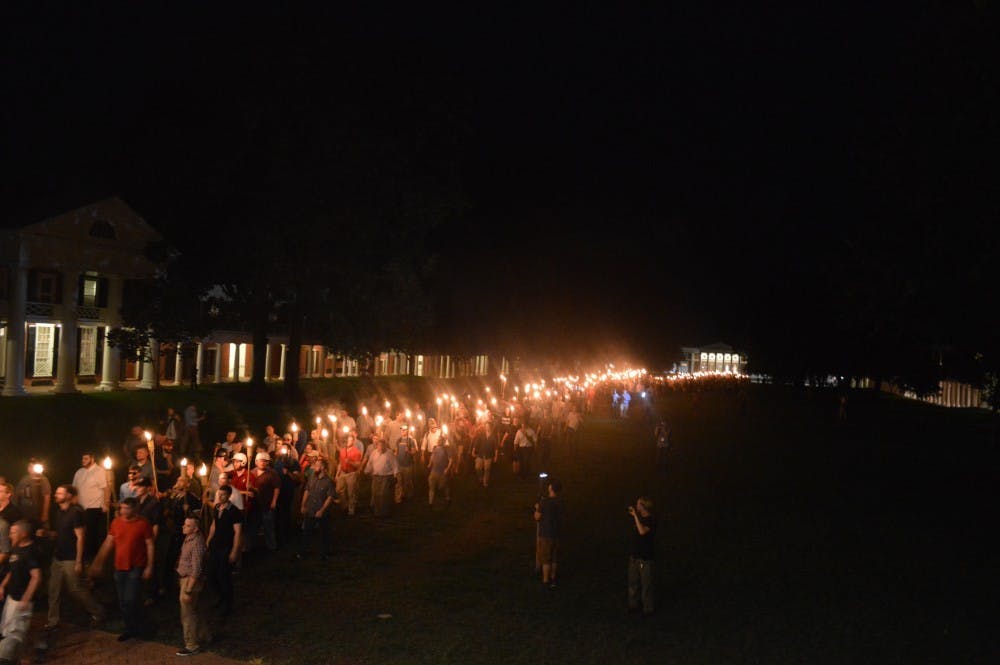We are living in an age of growing polarization of the political right and left. As exemplified by the Unite the Right rallies in Charlottesville and D.C., it is clear that tribalism, nativism and xenophobia are alive and well in the United States of America. On Aug. 11 and 12, a sizable crowd of counter-protestors comprised of University students, faculty and Charlottesville residents gathered in solidarity and in memory of those who were psychologically scarred, physically injured or in Heather Heyer’s case, killed, during the last year’s Unite the Right rally in Charlottesville. The violence and bigotry of last year’s rally continue to haunt the memories of the American people today, especially those who consider Charlottesville home. Over the past year, Americans have struggled to understand just how the white nationalist movement is psychologically capable of harboring so much hatred against other human beings. After deeply pondering the issue, however, I have realized something. The white nationalist movement would be nothing without its key ingredient: fear.
Fear is a unique emotion in that it has the capacity to trump rationality and empathy by inculcating the notion that a particular group of people poses a threat of imminent danger to society at large. Fear-mongering politics emerges when a particular group believes that a minority class of people will either displace a “favored group” or in some way disrupt their idealized — albeit distorted — vision of society. Power dynamics play a major role in this psychological phenomenon, creating a stark divide between the “favored” group and those who threaten that group’s position of power in society. When the “favored” group feels threatened by the latter, it will often invoke force or use the “Us vs. Them” rhetoric to suppress or even eliminate that class of people. Because fear-mongering politics emerges from a resistance to the unfamiliar or the unknown, it has the obvious tendency to target minority ethnic, racial and religious groups.
The “Politics of Fear” is rampant throughout the world around us. It was one of the major causes of Brexit. It is the driving force of Islamic extremism. And as history shows us, the most abhorrent authoritarian regimes — Stalin’s Soviet Union and Nazi Germany — used fear-mongering politics to militarize societies and wipe out entire classes of people. This “Politics of Fear” has thrived in America since the country’s founding. Just as the Chinese Exclusion Act, the Ku Klux Klan and Japanese internment sought to subjugate political, ethnic and religious minorities which posed a “threat” to white America, the white nationalist movement has made it clear that it intends to to the same.
We are living in an era in which white supremacy rallies and executive orders validate the dehumanization of ethnic and religious minorities. Self-proclaimed neo-Nazis and leaders of the white nationalist movement Richard Spencer and Jason Kessler galvanize fear of “the other” to target minority communities, hence the frequently iterated moniker, “Unite the Right.” They scapegoat particular minority groups as the root cause of political and societal ills. Where fear does not exist, white nationalist leaders will manufacture it. Oftentimes, communities are mobilized to begin fearing minority communities with whom they have lived for decades, creating a vicious cycle of distrust that can quickly spiral into violence.
Politicians and campaigns constantly harness this strategy to win voters. “Fear is easy,” says Rick Wilson, a political campaign ad maker from Florida. He argues, “You associate your opponent with terror, with fear, with crime, with causing pain and uncertainty.” Even our president does it. As the Atlantic asserts, “Trump is a master of fear, invoking it in concrete and abstract ways, summoning and validating it.” Now this is obviously not to say that every Trump supporter is a neo-Nazi. However, it is evident in the rhetoric he espouses and the policies he enacts that Trump embraces a “Politics of Fear.”
Trump’s travel ban, “build the wall” bombast, caging of immigrant children and protectionist trade policies have made it clear that he will not hesitate to channel the American people’s fear against ethnic minorities and competing economies into hateful legislation. Though Trump’s “Politics of Fear” pales in comparison to the white supremacist and anti-Semitic rhetoric advocated by white nationalists, the fact that its members have exclaimed “Heil Trump” during their rallies indicates that Trump is not doing a good enough job at dissociating his ideology from white nationalist sentiments. While we can’t blame Trump for the rise of neo-Nazism, we must demand that he disavow the movement at all costs.
There is no magic formula that will cause xenophobia, racism, sexism or homophobia to simply disappear. But what we can do is control the way we react to it. Don’t give into the fear the white nationalist movement is trying to ignite within you, because doing so only fuels their convictions. Use education and civic dialogue as a mechanism to curb ignorance. And rather than remain a passive bystander to the institutionalization of hate within our society, don’t be afraid to take a stand.
Audrey Fahlberg is an Opinion Columnist for The Cavalier Daily. She can be reached at opinion@cavalierdaily.com.







